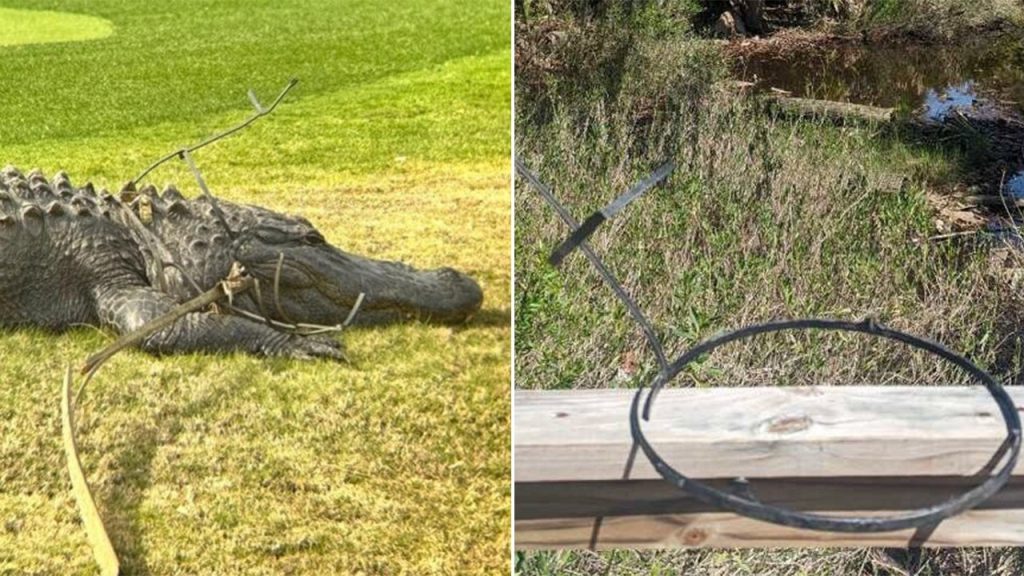A South Carolina alligator named King Arthur recently caught the attention of wildlife experts in Georgia when it was discovered with a strange object on its head at Fripp Island Golf & Beach Resort. The University of Georgia Coastal Ecology Lab shared the story on Facebook, explaining that the 11-foot-long alligator had somehow managed to get a tomato cage stuck over its head. Initially, the lab advised against human intervention and opted to monitor the animal to see if it could free itself from the object. After two days, the alligator was able to partially break the cage and loosen it from its neck, but it was still causing concerns about the animal’s ability to eat and potentially getting stuck underwater and drowning.
After observing the alligator for a few days and seeing that it was struggling to free itself, the Georgia researchers decided that human intervention was necessary. With assistance from the resort’s head naturalist, the team traveled to South Carolina, captured the alligator, and successfully removed the tomato cage from its head. The process was challenging, as the cage was in a location where a gator would typically be snared, but after several attempts, the experts were able to free the animal. Once the cage was removed, the alligator was able to resume its normal behaviors and safely return to its habitat.
The exact circumstances that led to the alligator becoming trapped in the tomato cage remain unclear, but the UGA Coastal Ecology Lab speculated that the gator may have swum through a pipe and rammed into the object. The incident serves as a reminder of the importance of properly disposing of trash, as wildlife can become entangled or injured by items left in their environment. The lab emphasized the need for responsible waste management to avoid situations where animals suffer due to human negligence. The Fripp Island Golf & Beach Resort expressed gratitude to the wildlife experts for their efforts in saving the alligator and ensuring its well-being.
The successful rescue of the alligator named King Arthur highlighted the importance of conservation efforts and the role that experts play in protecting wildlife. By monitoring the animal closely and intervening when necessary, the team was able to prevent potential harm to the alligator and ensure its continued survival in its natural habitat. The collaborative effort between the UGA Coastal Ecology Lab and the resort’s staff demonstrated the value of partnerships in wildlife conservation and the dedication of individuals to safeguarding endangered species. The story serves as a heartwarming reminder of the impact that human intervention can have in preserving and protecting the environment and its inhabitants.
Overall, the story of King Arthur the alligator’s rescue showcases the compassion and dedication of wildlife experts in ensuring the well-being of animals in need. Through careful observation, strategic planning, and timely intervention, the team was able to assist the alligator and safely remove the object causing it harm. The incident also highlights the importance of responsible waste management and the detrimental effects that trash can have on wildlife. By raising awareness of these issues and taking action to address them, individuals can contribute to the conservation of ecosystems and the protection of vulnerable species like King Arthur. The collaboration between different organizations in this rescue effort serves as a powerful example of the positive impact that collective action can have on wildlife preservation.


